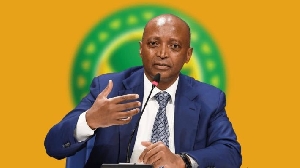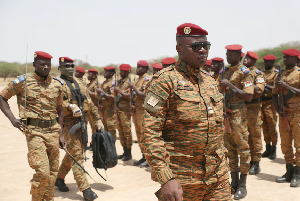By Samwin J Banienuba
Although opinions of what constitutes human security vary, freedom from fear and want is palpably the closest consensus definition. To that, the United Nations insists on adding the freedom to take action on one’s own behalf. These are individual freedoms and the correlation between them and human, national and global development is tenable.
States have direct responsibility to protect and advance human security, but the quota of non-state and international actors has been growing significantly in expectation, especially with increased globalisation. It is social responsibility.
Yet, until quite recently the mention and study of human security was an unknown quantity and still hardly debated in public forums including the media. The United Nations only formalised attention to it in 2000 when it launched the Commission on Human Security (UNCHS) at the Millennium Summit. It is relatively a late entry in security parlance and its study remains a recent phenomenon.
Instead, and for time immemorial, security has been state-centric or ‘national’ and thus construed to imply the defence of states. National security requires the intervention of power to maintain the survival of states against internal and external threats. Thus, the concept of national or state security is arguably as old as the evolution of the nation state itself.
Today economic, political and diplomatic powers have become the primary tools of projecting national security first and foremost. In yesteryears such power was manifested mainly by the capacity of one nation’s military or security forces to intimidate other nations. It is perhaps not history yet.
But in those yesteryears states did hurry into wars against states in the name of national security. Examples are not in short supply, nor are they even in recent times. While international law came in timely to referee what war is fair or foul, states still reserve the right to legitimate use of violence in defence of national interests of which national security is supreme.
It also once served the interest of governments to interpret national security in terms of their own subjective survival. For such governments the enemy was often within and needed to be crushed by use of agents of national security. The reign of fear and an adulating or pliable civil population was what national security implied and sought to achieve.
Brutish force did the job in the form of summary executions, disappearances, mugging, torture and confinements without trial amongst others. The death penalty in statutes of some states today still intends that effect in many cases. Otherwise, repressive policing, intrusive surveillance, propaganda and other forms of rigid and subtle control measures sufficed.
Those often assigned the tasks of legitimate violence are visibly the uniformed men and women in the military and police services. Many others are plain clothed and not unusually embedded in society. Intelligence is their formal name and they have acquired the unenviable appellation of spies from a modus operandi that is typically covert.
The dynamics of security can help fuel negative perceptions of operatives of which the police come out worse with unpalatable nicknames. Ironically they are by their noble role peace officers, and peace officers do put their lives on the line for the common good of the nation and general public. In particular, police officers do get maimed or killed while enforcing the law and so do personnel of the intelligence and military services in pursuits of national interests.
This understanding of security is probably core to Max Weber’s definition of state as that entity with a monopoly of exercising legitimate violence for purposes of survival. It is also possibly why civil populations caught up in the security debate speak so much with the tongue and voice of the state to the extent of which national security is what makes common sense even for non-initiates of the security industry.
With the possible exception of the Israeli-Palestinian conflict, nowhere but in Africa has the exercise of national security operations given rise for so much public commentary. In 2005 the University of British Columbia detailed a grim report of conflict and mayhem in the continent where more people were killed and displaced than in the rest of the world combined.
Whatever causes the mayhem, the impact is fear, want and denial of empowerment. It casts an ugly face of human vulnerabilities and challenges us to the calls of human security. This call has echoes in Ghana even as the human insecurity we confront is of a lesser magnitude.
We may have achieved freedom of fear of the state but another fear stares us in the face. President Mahama recently had to publicly reassure the nation that there was no cause for anybody to live in fear. It came in the wake of reports that armed gangs brazenly held parts of the garden city of Kumasi hostage and shot indiscriminately into law abiding citizens going about their bread and butter issues.
The reassurance is timely in today’s world where terror groups find gain and courage to challenge the very authorities vested with the legitimate use of violence. In the Kumasi story residents were reported to have been so terrorised they elected to stay safe at home or close businesses earlier than usual. How more detrimental could fear be?
Coming at a time when the United States Department of State's Bureau of Diplomatic Security rates Ghana a high crime threat post it can suggest a nation in fear and a nation in fear is a no go area. This maybe far from an on the ground reflection of crime in homeland Ghana but still a wakeup call to our security agencies to go the extra mile. Besides the obvious resourcing that security agencies need to up their game, quality training in community relations is no less important.
But resolving fear of terror or crime alone is not holistic. The fear of disease and actual disaster as lately reported in the three Northern regions is as much a human security threat as is criminality. This requires robust systems that can be activated at the spur of the moment and a health service capable of rising to the occasion.
Similarly, it is flawed to address fear in isolation of want. An inclusive national agenda for human development is an imperative prerequisite. While at it, we have to be bold enough to identify and target development inputs at those communities and segments of society most left out over the years by traditional distribution methods of the national cake.
In its 2003 first report, the newly constituted UNCHS established that human security is an approach that combines human protection with human development and correlates to peace, security and sustainable development. Critics argue this is too encompassing and therefore too ambitious.
Too ambitious is not the same as irrelevant or superfluous. Human security validates the reinforcing mutuality of different facets of development. As one sector Initiative didactically suggests, we cannot be secure amidst starvation, build peace without alleviating poverty, and build freedom on foundations of injustice. It is the epicentre of all development and national security efforts, far too important not to feature in media attention and public debate.
The writer is freelance International Relations and Development Analyst and the International Spokesperson for Humanitas Afrika. He can be reached at gyilli@live.com
Opinions of Monday, 25 March 2013
Columnist: Banienuba, Samwin J.














